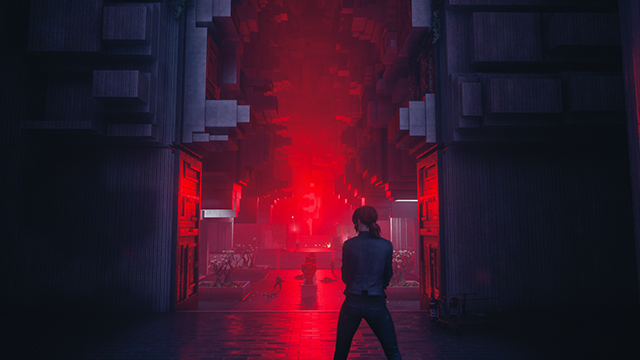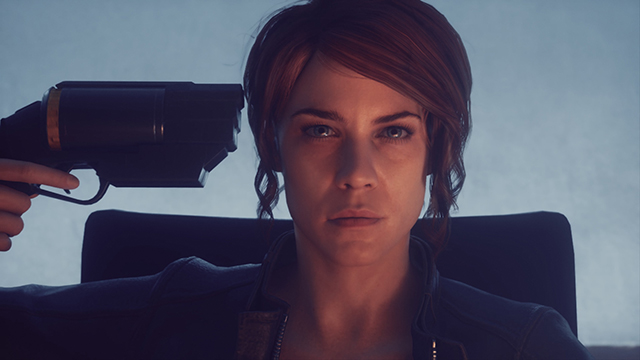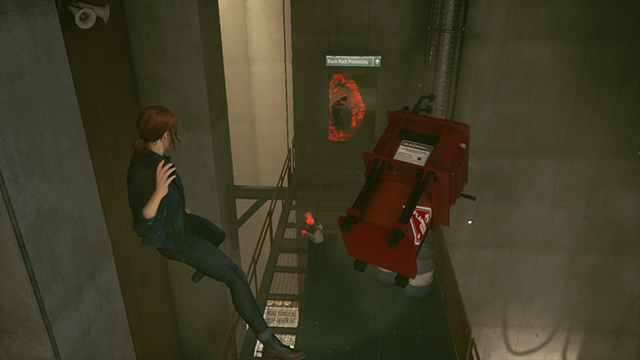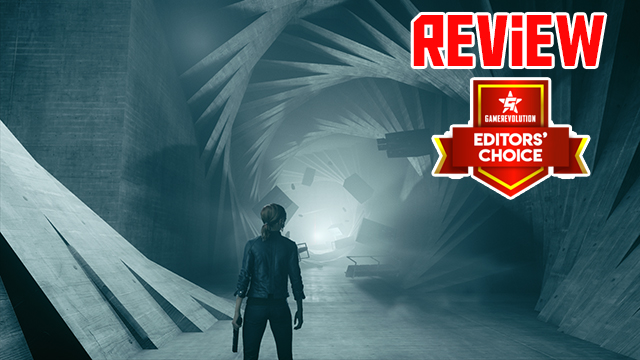Remedy has not been shy about its affection for twisted filmmaker David Lynch. And if Alan Wake was a nod to Twin Peaks, then CONTROL is a violently unsubtle nod to Lynch’s entire filmography that’s been dipped in the new weird genre and jettisoned into the astral plane. Although Control is not just a collage of homages as Remedy has used those influences as an outline to house its a wholly unique world filled with bizarre, unexplainable oddities and madness. But there’s a method to this madness and what an incredible method it is.
Most of Control’s madness stems from its universe. It takes place entirely within a structure called the Oldest House, a building that is bigger on the inside than what its physical outer boundaries could realistically allow. In these deceptive walls lies the Federal Bureau of Control, a secret, semi-shady organization meant to explain, study, and hide the paranormal activities in the world that defy logic and reason. It’s a regular-looking Manhattan building on the outside and a vast, paranormal investigation firm on the inside.
Control Review | The most haunted of houses

But Remedy did not just settle for a mere X-Files-esque set dressing for the game with a handful of cheap audio logs and heavy-handed, blood-on-the-wall-graffiti environmental storytelling. Instead, the talented team has meticulously created a multifaceted approach to worldbuilding that comes through in every aspect of the game. The astounding number of audio messages, documents, and in-world videos that are scattered around give an overwhelming amount of detail about the FBC and its many aspects that truly paint how vast and deep this organization goes.
ALSO: How Control learned from Dark Souls to trust its players
Since the Oldest House is so enormous, it has a variety of different departments with different specializations. And almost every document pertains to where it is found and explains what you’re seeing or what is happening in that specific area. Instead of other games that haphazardly throw lore-building collectibles in random locations, Control’s are deliberately placed and better contextualize what you’re immediately witnessing or what you’re eventually find. Either way, by creating a world with explainer collectibles in mind (or vice versa), Remedy has built a complex universe that is more real and gives players the means to try to understand it.
The Oldest House also stands on its own, aside from the directly supernatural aspects too. Its quarters are filled with functional areas like bathrooms, offices, cafeterias, and relatively empty rooms that make it feel like an actual, lived-in place. Some of the notes even detail office drama and book clubs, humanizing the employees that work there and show that, despite their otherworldly profession, they are just people. All of these aspects coalesce and form one of the most thorough video game universes in the medium.
Reading and exploring play a big role in how players will partake in its lore and Remedy encourages this by hooking players through their desire to learn. Control’s world is naturally unnatural and these surreal, unexplained phenomena beg to be dissected. The aforementioned collectibles offer just enough explanation while also redacting a decent portion of lines to hold onto some sense of secrecy. This cycle of witnessing something odd and learning more about it from a file or cutscene is masterfully doled out as it constantly keeps you on the hook, ready to unearth more unusual information after every digested chunk of information. Not everything has — or needs — an explanation and only some of it is directly told to you, but it still leverages the player’s curiosity and rewards it like few other video games.
The Oldest House is symbolic of this ideal. The 1950s-era sleek Brutalist design is simple yet foreboding, elegantly communicating that this is a pragmatic organization only concerned with studying and hiding secrets and not setting up stylish furniture that matches the drapes. The in-world signs are also pragmatic, as they are diegetic ways to point players to where they’ll need to go. Signposting like this is more immersive and goes with the game’s intention of getting the player to actually think over mindlessly following a waypoint. Puzzles are also similarly set up, as the game lets you figure out what to and bask in the satisfaction of figuring it out yourself.
But being an abnormal building, the Oldest House is at its best when it is twisting and bending in unfathomable ways. While there are some impressive, trippy transformation scenes reminiscent of The Matrix or Doctor Strange, the lighting is the best part as it paints entire rooms in blinding light that conveys that this place is not of this world. Given how impressive some of the architecture is, it’s a shame the game doesn’t have a Photo Mode to let players better admire its beauty. Seeing how the Oldest House adapts and shifts from the powers that be is a visual spectacle that encourages players to peek around the next corner and inspect every room in order to find out what else this odd building has in store.
Control Review | Sitting in the Director’s chair

The narrative also follows the same cues to get players to keep going. Protagonist Jesse Faden ends up trekking to the Oldest House to find her brother who went missing many years ago. She’s hardly able to ring the bell at the front desk before she is crowned Director of the entire place, a coveted position reserved for only one person at a time. Her newfound power not only unlocks untapped abilities along the way, but also enables her to find her brother without running into as much bureaucratic red tape.
Control’s core plot utilizes the same mystery and intrigue that make the optional narrative content so enjoyable. But the difference here is that it uses its center stage to let players also enjoy the writing, pacing, and performances in a way those other aspects can’t quite do. Jesse is mostly admirable through her confidence and ability to handle what gets thrown at her while her inner monologues and occasional wit fill her out as a more complete person. Secondary characters are likable too, benefiting from the well-written script and natural acting; two qualities that are hard to pair with a script full of made-up jargon.
Most of the base plot isn’t as twisty as the lore surrounding it as might imply yet said twisty lore makes up for it. Learning about the world and all of its terms while also keeping up with narrative swerves might be a little hard to follow, after all. Even though you’ll catch enough of it to be entertained, it’s already admittedly hard to follow some parts since it dives pretty deeply into The Weird™. Few will probably completely absorb the story the first run through, but Control is a game that’s meant to played multiple times as you grasp more parts in each run like a Stanley Kubrick or Quentin Tarantino film.
Control Review | Control‘s controls

And while Alan Wake and Quantum Break also had similarly brain-bending stories, they weren’t quite as enjoyable to actually play. Quantum Break’s encounters were slowly paced and far too easy and Alan Wake was a functional, yet incredibly basic third-person shooter. Control cranks up the tempo and encourages players move forward and constantly think on their feet. Like 2016’s Doom, health pours out of slain enemies and constantly killing is the only way to stave off death. Jesse’s handful of abilities allow you to close the gap and always be on the move, granted you can balance her power meter effectively while also giving her shapeshifting gun enough time to recharge.
Managing both bars and utilizing the game’s fluid movement options gives the player the ability to effectively burn through enemies if they can think and react fast enough. Maintaining killstreaks not only keeps you alive, but it’s also a way to make the combat consistently engaging on the moment-to-moment level as chaining everything together is incredibly satisfying. It encourages you to play it as aggressively as you can and gives you the tools and tight controls to do so. And even though the upgrade trees are a bit basic and the weapon only allows for two forms at a time, gunplay is frenetic and a solid match to the more cerebral narrative elements as it challenges your mind and reflexes.
Control Review | Glitches in the matrix

But it can sometimes be a bit too hectic for its own good as Control runs rather terribly on a base PS4 (and likely the base Xbox One, though we could not test that version), especially during shooting segments. Battles often leave environments looking like a tattered war zone as papers flutter through the air, furniture is thrown askew, and giant cement chunks are tossed about like small pebbles. The effects are undeniably impressive and are reminiscent of an explosive shootout in a John Woo film, yet the base, non-Pro systems simply can’t keep up with such high computational demands. Going through menus can also be a bit sluggish but the frame rate crumbles during most battles and devolves into a slideshow in the busiest segments (except the PC version that we tested on launch day, which ran excellently).
Long load times also make the checkpoints even more agonizing, as most of them can set you back quite far. Returning to the action takes a bit too long, especially when there are more obvious checkpoints the game could use to cut down on unnecessary backtracking. They’re never too egregious but retracing your steps slow down the game’s momentum.
Boss fights exacerbate the annoying checkpointing because how suddenly they spike the difficulty. Control is a satisfyingly hard game that requires your attention but bosses push the needle too far. Not including the frustrating fatal environmental hazards, each can kill you in only two or so hits, which is quite unforgiving. And since health recovery is reliant on multiple enemies dying, you’ll often have to have nearly perfect runs since there aren’t always adds to farm for health. Sometimes a boss will drop health but it’s few and far between and still secondary to the bigger problem: they do too much damage and dying kills the otherwise strong pacing.
The Oldest House’s cement foundation is sturdy enough to withstand these issues as Control is still both Remedy’s biggest and best game. Quantity does not equal quality but upping both at the same time is an elusive task that many developers don’t quite nail. The uncanny story only gets better for those who delve into its extensive pieces of lore. Its combat is inherently energetic and gratifying and more so once you combine different abilities and play it at faster speeds. From its narrative to its world to its puzzles and combat, Control intrigues its players and invites them to think and rewards them handily for doing so; a true remedy for overly linear and coddling game design.
GameRevolution reviewed Control on PS4 with a copy provided by the publisher.
-
Fast-paced combat that encourages experimentation and aggressive play.
-
A fascinating world full of deep, intriguing lore and a staggering attention to detail.
-
Puzzles, objectives, and traversal push players to think for themselves.
-
Great performances from a small, but noteworthy cast.
-
Beautifully constructed, destructible, Brutalist environments that are open yet linear.
-
Very, very weird but intelligently so.
-
Frequently shaky performance on non-Pro consoles.
-
Overly punishing boss fights.
-
Checkpoints are usually a bit too spread out.











